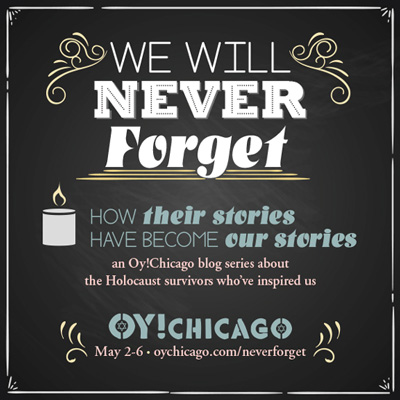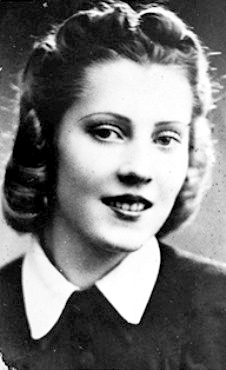A hero’s story
Permanent link All Posts
This piece was originally posted on Oy!Chicago in April 2012 and has been re-published for this blog series.
When I was in junior high, my family hosted a woman in our home who was in town for a weekend speaking engagement. She was in her 70s at the time, blonde, and wore tailored skirt suits. Warm and gentle, yet strong, she reminded me of my grandmothers.

Irene Gut Opdyke
Photo credit: United States Holocaust Memorial Museum
I knew, even back then, that she was special, but I didn't realize how special until a decade later when I spotted her name at Yad Vashem on the list of "Righteous Among the Nations"—or "Righteous Gentiles"—non-Jews who risked their lives to save Jews during the Holocaust. In addition to her, by the end of 2010, Yad Vashem had recognized 23,788 Righteous Among the Nations from 45 countries.
As Yom Hashoah—Holocaust Remembrance Day—arrives this week, it seems fitting to tell the story of this incredible woman who in one weekend taught me what it means to be a hero.
Irene Gut was born to a Polish Catholic family, the eldest of five daughters. When Russia and Germany invaded Poland at the start of the war, Irene was a 17-year-old nursing student. She joined the Polish underground to care for the sick and wounded, and she eventually became separated from her family. A group of Russian soldiers discovered her hiding in the forest with other resistance fighters. The soldiers beat and gang-raped Irene and then sent her to a hospital to aid the Russians.
In search of her family, she fled the hospital, but was soon captured by Germans, and sent to a munitions factory in Poland, where she collapsed from hard labor. Irene, a pretty girl with Aryan features, caught the attention of a 70-year-old German officer, Major Eduard Rugemer, who took a liking to her and assigned her to less taxing work in the mess hall. Amid the horrific conditions she saw of the Jews in the ghetto, she witnessed Nazi soldiers throw a baby in the air and shoot the child for sport, an image that haunted Irene her entire life.
Later, Rugemer employed Irene as a housekeeper in his villa in Ukraine, where her duties included supervising laundry service, carried out by a staff of 12 Jews. When she heard of plans to kill the Jewish employees, Irene insisted on hiding them in the cellar of the villa—smuggling them food and clothing—without the officer's knowledge.
One day, Rugemer came home early and discovered the hidden Jews. Irene pleaded with him not to turn them in, bargaining to become Rugemer's mistress if he would let them stay. She never told her Jewish friends how she kept them hidden, yet she did confess her secret to a priest, who urged her to turn the Jews in. But Irene refused.
In all, she hid her Jewish friends for nine months. When one of the hidden women became pregnant, Irene convinced the mother-to-be not to have an abortion. In 1944, Irene fled with the Jews to the forest, where the baby was eventually born.
At war's end, her Jewish friends helped her escape to West Germany, where she briefly met William Opdyke, an American working for the United Nations. Around this time, she also learned the whereabouts of her family: her father had been killed by Germans, while her mother and four sisters survived.
A few years later, aided by a Jewish resettlement organization, Irene immigrated to New York, where she bumped into Opdyke at a café. Only months later, they married and had a daughter, settling in Southern California.
It wasn't until later in her life—after hearing claims that the Holocaust was an exaggeration—that Irene chose to share her harrowing story, writing a book (with Jennifer Armstrong) called In My Hands: Memories of a Holocaust Rescuer, and speaking for educational groups. In 1982, Irene was recognized as a "Righteous Gentile" by Yad Vashem. It was at that ceremony that Irene met the baby-by then a grown man-she had saved, who owed his life to her.
Irene passed away in 2003 at the age of 86. Two years ago, a show about her life, called Irena's Vow, played on Broadway.
There are certain people who come into our lives who are etched in our memory forever. Irene, for me, is one of those people. I only spent one weekend with her all those years ago, but I credit her with teaching me so much about compassion, empathy, and strength.
Irene is no longer here to share her journey, but I pledge to tell her story for her—and other heroes like her—to as many people as I can. I hope you'll do the same.



.jpg)



